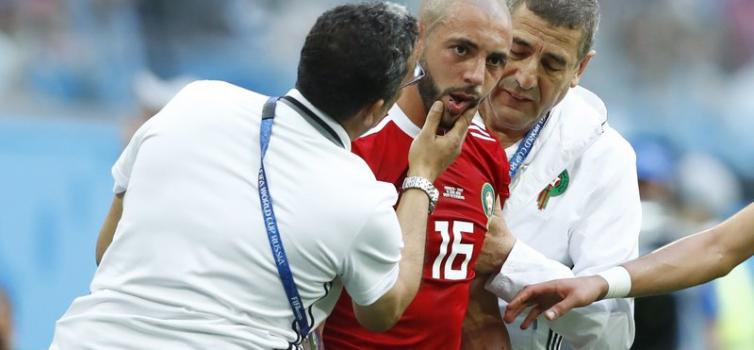Fifa urged to improve concussion protocols after Amrabat incident

Amrabat has been ruled out of Moroccos' game v Portugal on Wednesday
FIFA has been urged to improve its concussion protocols following the 'negligent' treatment given to Morocco’s Nordin Amrabat during the game against Iran on Friday.
The 31-year-old Watford midfielder fell heavily on his head in the 72nd minute of the game and appeared groggy and disorientated. The treatment he subsequently received attracted criticism and incredulity from around the world.
Morocco's medical team sprayed water in his face, slapped him on the cheeks and placed an ice pack on top of his head. The player was eager to continue in the game but, thankfully, was substituted for brother Sofyan in the 76th minute.
Amrabat has now been ruled out of Morocco's next Group B game against Portugal on Wednesday because of suspected concussion.
Paul Godfrey, the former Head of Medical Services at Cardiff City, posted on LinkedIn: “What on earth was the Moroccan medical team team doing with one of their players who clearly had concussion? The clinical management of this player was appalling and just goes to show how well players are looked after in the UK.
“The Moroccan approach was negligent at best. Fifa needs to standardise pitch-side emergency medical care and the expertise all medical practitioners must have if they are to work at international tournaments such as the World Cup. Shocking!”
Fifa has introduced three new measures relating to concussion for the 2018 World Cup:
- The referee can stop the game for three minutes in order for the medical team to assess a player.
- Physicians have to final say on whether a player is fit to continue in the game.
- A second physician has access to in-match video replays of player injuries and incidents.
However, this falls short of what could be done. The Premier League doctors group has called for ‘concussion bins’ to be introduced, allowing temporary subs to be brought on for 10 minutes while a player is properly assessed for concussion.
There have also been calls for a fourth substitution to be available when a team believes a player is concussed.
According to research published in the Journal of American Medical Associations, there were 81 ‘head collisions’ at the 2014 World Cup. Of these, 67 were adjudged to have exhibited two or more ‘concussion symptoms’. And concussion protocols were not followed in the majority of cases.



-1.png)





